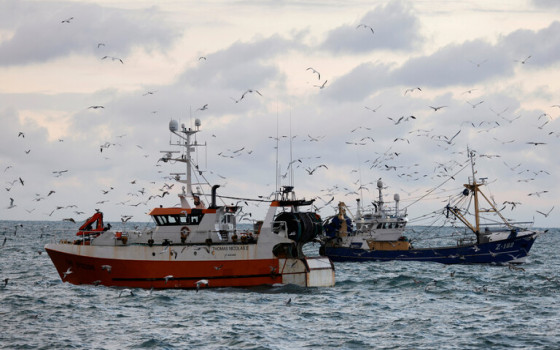
The European Union, the world's largest importer of fish products, raises the red card against Cameroon because of illegal fishing

- Europe and Arabs
- Thursday , 5 January 2023 21:13 PM GMT
Brussels: Europe and the Arabs
The European Commission in Brussels has decided to designate Cameroon as a non-cooperative country in the fight against illegal, unreported and unregulated (IUU) fishing, giving it a so-called "red card".
From now on, EU member states are required to refuse to import fish products from Cameroon even when they are accompanied by fishing certificates validated by the national authorities.
Today's decision is based on the "EU Regulation on Illegal, Unreported and Unregulated Fishing", which ensures that only legally caught fishery products can access the EU market, according to a statement issued by the bloc's executive.
The European statement stated, “Cameroon’s inclusion is based on the continued existence of serious deficiencies identified in a notification adopted in February 2021 that already warned of the possibility of Cameroon being identified as a non-cooperative country. It is based in particular on the failure of the Cameroonian authorities to ensure adequate oversight of the national fishing fleet and to take measures corrective measures needed to stop and prevent illegal, unreported and unregulated fishing activities.
Cameroon has continued to register fishing vessels operating outside its waters, including IUU fishing vessels, while there is a lack of monitoring of their activities.
According to the Brussels Commission, illegal, unreported and unregulated fishing is one of the most serious threats to the sustainable exploitation of living aquatic resources. Illegal, unreported and unregulated fishing threatens the basis of the EU's Common Fisheries Policy (CFP) and EU efforts at the international level to promote better ocean governance.
Illegal, unreported and unregulated fishing poses a significant threat to the marine environment and marine biodiversity. By pursuing the European Green Deal as well as the United Nations Sustainable Development Goal to conserve and sustainably use oceans and marine and marine resources, the Commission applies a zero-tolerance approach to illegal, unreported and unregulated fishing.
Among its actions, the Commission cooperates with third countries with the aim of improving fisheries management and ensuring that all countries adhere to their international obligations.
next steps
UNHCR will continue its dialogue with the Cameroonian authorities to assist the country in addressing the shortcomings identified.
The Commission will now propose to the Council of the European Union to add Cameroon to the list of non-cooperative countries.
The global value of illegal, unreported and unregulated fishing is estimated to be between 10 and 20 billion euros annually. Between 11 and 26 million tons of fish are caught illegally each year, which equates to at least 15% of the global catch.
Today's Commission decision builds on the EU's "illegal, unreported and unregulated" regulation, which came into force in 2010. One of its pillars is the catch certification scheme which aims to ensure that only legally caught fisheries products have access to the market. European Union. The regulation also provides for specific dialogue mechanisms with countries that do not comply with their obligations as a flag state, coastal state, port state and market state under international law. While failure to cooperate within the framework of the Dialogue can lead to country selection (the so-called “red card” and subsequent “list”), the IUU Dialogues are based on cooperation and support for countries and are an important step in tackling IUU fishing . An overview of the process is provided in this diagram.
Since November 2012, the Commission has entered into formal dialogues with 26 third countries, with which it has formally warned of the need for effective measures to combat illegal, unreported and unregulated fishing. In most cases, significant progress has been noted, and the Committee can therefore satisfactorily close the formal dialogue stage and raise the decisions taken. Only a few countries have not shown the necessary commitment or taken measures to correct the shortcomings identified.
The European Union is the largest importer of fish products in the world. The EU’s contribution to SDG 14 of the 2030 Agenda is to end illegal, unreported and unregulated fishing and to conserve and sustainably use oceans and marine and marine resources.












No Comments Found